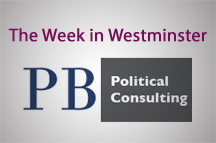 Education dominated the beginning of this week, with Labour and the Lib Dems among those angry at Michael Gove’s decision to remove Baroness Morgan as chairman of Ofsted. One former permanent secretary in Gove’s department claimed he is replacing “independent voices” with “yes men”. The way many conservatives see it, education is now a major political battleground without neutral territory. So in practice, supposed ‘independent voices’ have often bought into the left-wing educational establishment view, or at least have no interest in supporting a Secretary of State determined to overturn that view.
Education dominated the beginning of this week, with Labour and the Lib Dems among those angry at Michael Gove’s decision to remove Baroness Morgan as chairman of Ofsted. One former permanent secretary in Gove’s department claimed he is replacing “independent voices” with “yes men”. The way many conservatives see it, education is now a major political battleground without neutral territory. So in practice, supposed ‘independent voices’ have often bought into the left-wing educational establishment view, or at least have no interest in supporting a Secretary of State determined to overturn that view.
Meanwhile Gove announced measures to make state schools more like public and private schools, with ten hour school days, more discipline and tougher testing. Worthwhile in themselves, these measures also show that issues like education - not normally an area of Tory strength – don’t have to be handled by minimising how much the right and left disagree. Michael Gove is taking the fight to the left, and the early evidence is that he is winning.
Ed Miliband's proposed rule changes for future Labour leadership elections matter. They could easily determine some of the future Prime Ministers of this country. For now at least it points to the abolition of Labour's electoral college in favour of one member one vote for MPs, members and union members alike. Of course, the number of Labour MPs and members is dwarfed by the millions of trade union members, so a one member one vote system which includes union members gives enormous power to the union bosses. Readers who braved this week's tube strike may question the wisdom - electoral and otherwise - of giving the trade unions even more power.
 With Anne McIntosh MP and Tim Yeo MP deselected within days of one another, a wave of stories were written explaining it in grand terms. Was it part of a war on women? A direct threat to the PM’s authority? Anger at support for same sex marriage and renewable energy? No. National journalists hate writing stories that explain the news in terms of local factors that are irrelevant to most of their readers. At least readers outside Suffolk and Yorkshire will pay some attention to these grand, sweeping explanations. But local factors were the key for both.
With Anne McIntosh MP and Tim Yeo MP deselected within days of one another, a wave of stories were written explaining it in grand terms. Was it part of a war on women? A direct threat to the PM’s authority? Anger at support for same sex marriage and renewable energy? No. National journalists hate writing stories that explain the news in terms of local factors that are irrelevant to most of their readers. At least readers outside Suffolk and Yorkshire will pay some attention to these grand, sweeping explanations. But local factors were the key for both.
A trade association for Scotland's financial sector joined the groups that have come out strongly against independence this week. With more and more interested parties expressing their unease about independence from the UK, and given the status quo bias electorates around the world tend to show in referendums, could we see a landslide victory for the No campaign in September?
 Chris Grayling announced on Wednesday a Bill that will mean life sentences for anyone convicted of a second major terrorist offence, and an end to repeated cautions for serious offences. Will he be considered, alongside Gove, Duncan-Smith and Pickles as one of the great reformers of this government? He certainly will if he moves next to tackle the under-use of prison for serious, repeat offenders and the massive overuse of community sentences, suspended sentences and fines - and he'll fully deserve it.
Chris Grayling announced on Wednesday a Bill that will mean life sentences for anyone convicted of a second major terrorist offence, and an end to repeated cautions for serious offences. Will he be considered, alongside Gove, Duncan-Smith and Pickles as one of the great reformers of this government? He certainly will if he moves next to tackle the under-use of prison for serious, repeat offenders and the massive overuse of community sentences, suspended sentences and fines - and he'll fully deserve it.
Peter Cuthbertson
Account Director, PB Political Consulting












